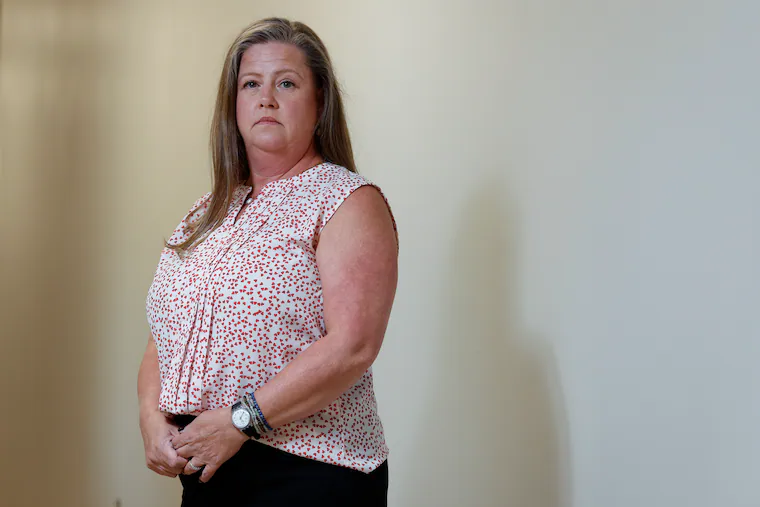
Veteran nurse Joyce Fisher had never seen a new mother as panicked as the one who now stood before her on the labor and delivery unit at Virtua Voorhees, screaming that the infant bundled in her arms, was not hers.
“She’s screaming ‘Where’s my baby’ and I can’t answer her,” Fisher recalled.
Fisher checked the ID bracelet on the infant cradled by the mother, and found it did not match the ID on the crib or the mother’s ID.
She brought the baby to the room that matched the information on its ID bracelet, and discovered the infant there belonged in the first room.
By then, both babies had been breastfed by the wrong mother, potentially exposing all four to diseases that can pass through breast milk, such as HIV.
Fisher called her supervisor and quickly determined that both newborns had been in the nursery overnight and were returned to the wrong rooms hours before she signed on for her July 5 morning shift.
Fisher thought she had done the right thing by reporting it to her supervisor.
But five days later, she was fired for gross negligence. Hospital administrators said Fisher could have prevented the babies from being breastfed by the wrong mother if she’d checked their ID bracelets at the start of her shift.
The incident highlights a perennial problem for safety efforts at health systems: Hospitals rely on staff to report errors, so they can address it and prevent the same mistake from happening again. But staff who speak up may also end up in the crosshairs.
Fisher detailed her experience in a wrongful termination lawsuit against the hospital and an interview with The Inquirer. The families involved in the baby-switch are not named in the lawsuit, and The Inquirer could not find public records indicating who they are.
Virtua declined to share its version of what happened or describe any internal investigation that led to Fisher’s termination. The South Jersey health system said in a statement it does not comment on pending lawsuits or personnel decisions, but that “every situation is thoroughly reviewed, and decisions are made with integrity, compassion, and in alignment with our values.”
“We are deeply committed to fostering a fair and just culture where every colleague is empowered and encouraged to speak up about safety concerns without fear of retaliation,” said Jennifer Khelil, Virtua’s chief clinical officer.
But Fisher says she had never heard of a rule requiring nurses to check ID bracelets at the start of every shift in her seven years at Virtua, during which time she trained new nurses and sat on her unit’s safety committee. She was blindsided by her termination, and said it felt like retaliation for reporting a colleague’s mistake.
Bioethicists say that mistakes are often symptomatic of larger problems within a hospital that can’t be fixed by eliminating staff members who make — or report — errors.
But hospitals are under enormous pressure to swiftly and soundly rectify errors, especially in the Philadelphia-area, where multimillion dollar malpractice judgments have contributed to skyrocketing malpractice insurance rates and forced some hospitals to shutter services, such as obstetrics, that are prone to lawsuits.
At the same time, penalizing individuals who report problems can have a chilling effect, further jeopardizing safety.
“Who is going to speak up now?” said Matthew Luber, an attorney with the Marlton firm McOmber McOmber & Luber who is representing Fisher.
» READ MORE: A breakdown on replay
Baby switch fallout at Virtua Voorhees
The longtime labor and delivery nurse had started her shift on that Saturday morning, July 5, much like any other.
She read the overnight report, which noted that two babies had been taken to the nursery the night before, at the parents’ request, and returned at 6 a.m.
Then she made her rounds, greeting each of the families and writing her name on the whiteboard in their room. One mother was breastfeeding a baby, another was dressed and eager to be discharged.
She gathered the infant care supplies the hospital sends home with postpartum patients. When she returned, the woman was in a panic.
After realizing what had happened, Fisher comforted the families, one of which requested that she remain their nurse for the rest of their stay, according to court documents.
Under the hospital’s breast milk mismanagement policy, both babies and both mothers needed to be tested for exposure. They were all cleared.
She was later put on administrative leave, while the hospital investigated the incident.
Fisher assumed that she’d return to work by the end of the week, after administrators had spoken to the nurse who accidentally switched the babies.
She was called into her supervisor’s office at the end of the week and was told she was being terminated immediately and reported to the New Jersey Board of Nursing.
Staff are required to check ID bracelets before any treatment, medication, therapy, procedure or specimen collection, and before being transported, according to a flier that Fisher says was passed around after the incident to remind staff of protocol.
Shift changes are not on the list, and Fisher said she was never trained to check ID bracelets at the beginning of her shift.
Virtua declined to respond to questions about its protocol for checking ID bracelets.
Her nursing license is active, according to public records. A spokesperson for the board was not immediately available to comment. Under New Jersey law, the Board of Nursing is not allowed to confirm or deny whether they are investigating a provider.
Balancing accountability and blame
Bioethicists cautioned that firing staffers who make — or report — mistakes likely won’t improve safety.
“The narrative that is going to spread like wildfire is that it’s not safe to report, which doesn’t serve anyone,” said Cynda Rushton, who is a clinical ethics professor at Johns Hopkins Berman Institute of Bioethics and the School of Nursing.
At the same time, hospitals must take medical errors seriously, as part of their responsibility to patients.
Hospitals can reduce the fear of retribution by being clear about what types of mistakes are severe enough to warrant termination. Policies for investigating errors should also be clear, so staff know what to expect when they report a problem, she said.
And the protocol for investigating mistakes should focus on identifying root causes — systemic issues that may have led to an individual staffer’s error.
“It takes courage for an organization to be able to seriously address systemic issues,” Rushton said. “It is much easier to focus on the symptom of the problem, which is the individual.”
» READ MORE: Left Behind
System changes are key to preventing mistakes from happening again, said Arthur R. Derse, director of the Center for Bioethics and Medical Humanities at the Medical College of Wisconsin.
For instance, after a series of anesthesia medication errors nationally, health systems and regulatory agencies pushed manufacturers to alter the tube connectors, so that it was impossible to connect tubes to the wrong medication tank.
Firing an anesthesiologist who made such a medication error would have prevented that individual from making the same mistake again, but the system change prevented anyone from repeating the error, he said.
Fisher said she followed the safety protocols as she best she knew at the time. She now fears her 16-year nursing career will be over.
“This could have happened to any nurse who clocked in that morning. It happened to be me,” she said.



